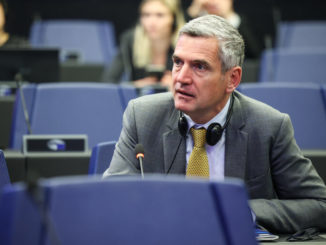
Lawmakers in both the European Parliament and the Council are currently hammering out their final positions on the EU’s plan to slash the use and risk of pesticides in half by 2030. So what is going on behind the scenes? ARC’s Natasha Foote gives you an inside glimpse on the current state of negotiations ahead of a definitive Parliament vote next week. Updated 16/11/23 at 14.42 CET to include link to all amend
The contentious sustainable use of pesticides regulation (SUR) proposal aims to slash the use and risk of pesticides in half by 2030, as set out in the EU’s flagship food policy, the Farm to Fork strategy.
The two lawmakers are edging towards establishing their final positions on the file, which will then provide the basis for discussion in the inter-institutional negotiations, known as ‘trilogues’.
With the Parliament set to vote on its final position next week and the time pressure of the looming EU elections, tensions are high behind the scenes.
Amendment bombardment – ENVi, AnGRI and more
NEW: Access all amendments as published 16/11/23 here
Over in the Parliament, an all-too-familiar ENVi vs AnGRI battle is raging behind the scenes, with lawmakers from the Parliament’s environment and agriculture committees clashing over the inclusion of amendments.
While the AGRI committee is not the lead committee on the new pesticide rules, it shares competence on parts of the file with the Parliament’s environment’s committee (ENVI).
Both committees approved their opinions on the EU’s sustainable use of pesticides regulation (SUR) in October ahead of a final vote on the Parliament’s position during the November plenary session.
Sharing competences on a file lead to inevitable tensions, with the two sides often pushing in different directions. According to the Parliament’s agriculture press officer, in the event that the committee responsible “fails to respect” the exclusive competence of the associated committee, that associated committee may table amendments directly in plenary.
And this is something that the chair of the European Parliament’s AGRI committee, Norbert Lins, intends to make full use of, according to internal email correspondence, seen by ARC.
In an email addressed to the group coordinators, Lins maintains that of the 27 amendments that fall under AGRI-ENVI shared competences, “it turns out ENVI has adopted none of them”. He goes on to propose that the AGRI committee tables these directly in plenary.
The main points of contention are over the timeline, with AGRI calling to push back the EU’s ambition from 2030 to 2035, as well as over the use of pesticides in sensitive areas.
However, the move has not gone down well with the Greens, who’s coordinator Martin Häusling pointed out in his rebuttal that the AGRI amendments in question were “covered in all cases by ENVI compromises”, noting that these were supported by a majority of groups.
“It is misleading to imply they were somehow rejected by ENVI,” he stressed.
The Green MEP added a warning that the approach needs more careful thought, otherwise the committee risks “tabling many unneeded and so confusing plenary [amendments]”.
Meanwhile, the AGRI committee is not the only one busy tabling amendments. Renew has also been active, as have the Socialists, with one source explaining that the Spanish Presidency has also been pushing hard to align the Parliament position with their own via Socialist MEP Clara Aguilera.
A press representative for the EPP group told ARC they are also likely to table amendments on both the timeline of the ambition and the issue of sensitive areas amid “high concerns on the impact on farmers”.
“Some amendments tabled by the committee, some by the EPP group and some by signatures by members from various groups including EPP,” they explained.
Watch out for amendments on sensitive areas and how much flexibility will be given to member states, the higher target of 65% reduction for more hazardous pesticides ,and rules for retail.
This ‘bombardment’ of amendments is likely to cause confusion in the plenary, according to one source. “It’s going to be a mess,” they said, warning that this could lead to a weakening of the Commission’s original proposal.
The debate on the issue is tabled for Tuesday (21 November), with the vote to follow.
New compromise text in the Council
On the other side of the coin, member states are also hashing out their position on the file.
According to sources inside a closed meeting on Friday (10 November), the Spanish Presidency put forward a new compromise draft text in efforts to find common ground between member states.
The draft text, seen by ARC (see below), weakens the proposed limitation on the use of pesticides in sensitive areas, and also proposes to scrap a reference to national targets following calls from some member states earlier this month.
The Commission’s original proposal on sustainable use of pesticides regulation (SUR), presented in June of 2022, proposes the annual calculation of tailor-made, national reduction targets, which, together, add up to an overall EU target of 50% reduction by 2030.
Instead, the new text sets out that member states shall set “indicative national contributions to meet, collectively, the overall Union target”. This is a move campaign groups have previously warned would reduce it to nothing.
A Frugal Farm to Fork – Update on Pesticides, new GMOs, Animal Welfare & Sustainable Food Systems
According to one source, the response to the compromise text would determine whether or not the Spanish Presidency continues work on the file for the remainder of its time holding the reins of the AGRIFISH Council.
However, the new text does not seem to have done the trick. “The new text did not bring member states closer together,” one source inside the closed meeting told ARC. “The majority of member states were not satisfied along known lines,” they said, pointing out that some want more ambition while some want less.
As for next steps, the source was as yet unclear. “What I know is that the presidency is now considering its next step, but no decision to stop working on the file has been made,” they added.
Asked by ARC if work will continue on the file, a representative from the Spanish Presidency declined to elaborate further on the discussion during the meeting, but confirmed that work would continue on the file.
The Spanish Presidency has previously said it hopes to negotiate a general approach in December.
More on Pesticides
Pesticide Regulation Progresses to Plenary Following Environment Committee Vote
Agri MEPs Move to Weaken Pesticide Regulation and Starve it of CAP funds
(Don’t) Show me the Money! Agri MEPs reject Green Cash Plan for Pesticide Reduction
The True Toll of Pesticides on Rural Health – Pesticides Analysis Part 2





